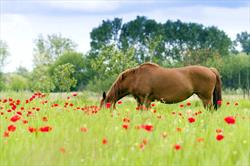Bob Judd, DVM, DABVP (Equine Medicine), DABVP (Canine and Feline Practice)
Horse in poppy field

Coughing in horses is not uncommon. There are many different causes why your horse may be coughing, and the cause determines the treatment.
Dr. Erica Lacher, DVM, of Springhill Equine Veterinary Clinic in Florida, says in the publication The Horse that there are many reasons for coughing in horses.
Feed-related coughs are usually associated with an oversensitive pharyngeal area in the back of the horse’s throat. Coughs occurring when your horse eats hay suggest an allergy to food, pollen, or fungal spores.
Horses that cough when entering the barn may be allergic to barn dust or ammonia. Many horses with these kinds of allergies develop asthma, and horses that cough while on pasture but are normal otherwise may have summer pasture-associated asthma.
Coughing at the start of exercise might be due to clearing mucous and may not be a big issue if the cough stops quickly. Coughs that persist while exercising could mean a more serious problem like infection, asthma, or an issue with the soft palate, which is a structure in the throat that, if displaced, decreases the ability of the horse to breathe.
Coughing after exercise could mean the horse may have bleeding in the lungs, called exercise-induced pulmonary hemorrhage. Mucous from a runny nose that is clear to white is likely due to allergy or dust, while a yellow or green nasal discharge likely indicates a bacterial or fungal infection.
If a fever is present with a temperature over 102.5 degrees Fahrenheit, pneumonia or other infection should be considered. If your horse is lethargic or not eating as well as usual, it is important to call your veterinarian for an exam. Although many clients want to start antibiotics if their horse is coughing, antibiotics are unnecessary in most cases of coughing and can actually be detrimental.